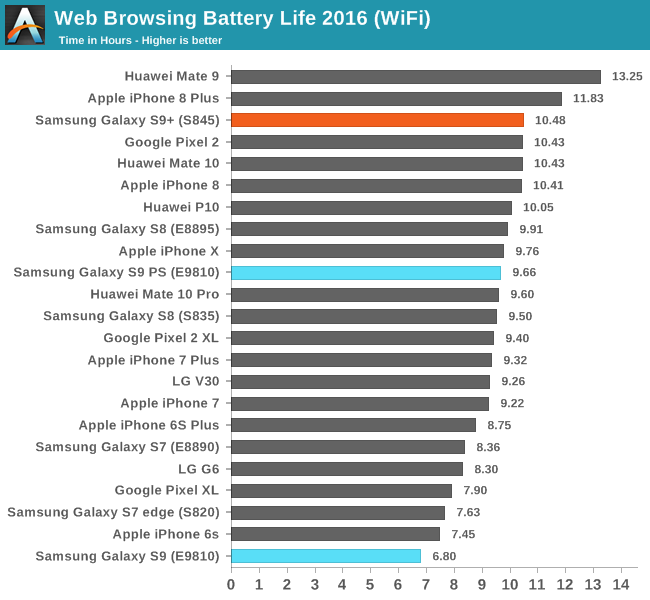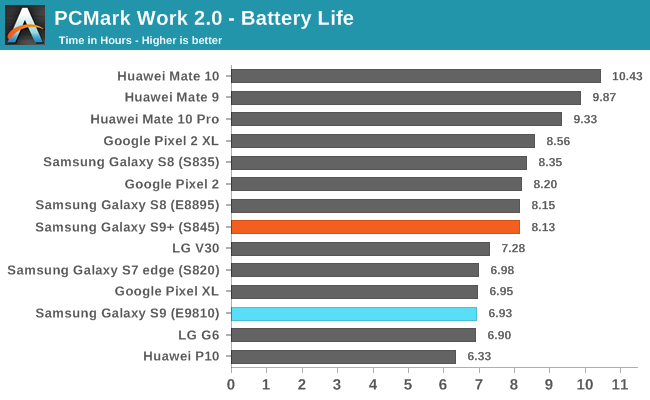The Samsung Galaxy S9 and S9+ Review: Exynos and Snapdragon at 960fps
by Andrei Frumusanu on March 26, 2018 10:00 AM ESTBattery Life - A Stark Contrast
We extensively covered the performance of the Snapdragon and Exynos Galaxy S9’s – what remains to be seen is how that performance affects battery life in our standard tests. Performance between the regular and larger Galaxy S9 doesn’t change, however battery life may differ based on the variant as the regular S9 sports a 3000mAh (11.55Wh) battery versus the 16% higher 3500mAh (13.47Wh) of the Galaxy S9+. Naturally the 14.2% bigger screen area of the S9+ offsets some of that advantage.
Unfortunately for this review we couldn’t get identical variants of the different SoC Galaxy S9s – our S9+ is a Snapdragon 845 unit while our S9 is an Exynos 9810 unit, so we weren’t able to execute a true apples-to-apples comparisons between the SoC variant, however as we’ll see the delta between the units is large enough that it won’t change the conclusion.
Our web browsing test tries to mimic real-world usage patterns of browsing websites. This includes iterating through a list of websites and scrolling through them. In this test, screen efficiency and battery size play a role, but also we balanced it so that it also sufficiently stresses the SoC (CPU, GPU and display pipeline) as well.

The Snapdragon 845 Galaxy S9+ posted excellent battery life in our test and lands only third to the iPhone 8 Plus and the Mate 9. Unfortunately we never tested the S8+ to see the generational difference, but it shouldn’t be too different from the S835 regular S8 at around the 10 hour mark.
The Exynos 9810 Galaxy S9 absolutely fell flat on its face in this test and posted the worst results among our tracking of the latest generation devices, lasting 3 hours less than the Exynos 8895 Galaxy S8. This was such a terrible run that I redid the test and still resulted in the same runtime.
I investigated the matter further to try to see if this was caused by the high energy usage of the M3 cores – and it seems it is. Enabling the “CPU limiter” (S9 PS result in the graphs) which is found in the battery optimisation options of Samsung’s firmware greatly throttles the M3 cores down to 1469 MHz, memory controller to half speed and also seemingly changes some scheduler settings to make them more conservative. This results in peak performance equal to the Exynos 8895- however the scheduler alterations also noticeably slow down UI responsiveness so it’s actually a worse experience. Nevertheless, backing off on performance results in regaining almost 3 hours.
This is such a terrible battery performance of the Exynos 9810 variant that it again puts even more clout into the new SoC. My theory as to why this happens is that not only do the higher frequency state require more energy per work done than competing SoCs – because this is a big CPU complex there’s also lots of leakage at play. The DVFS system being so slow might actually be bad for energy here as we might be seeing the opposite of race-to-sleep, walk-to-waste. The fact that Apple’s SoCs don’t have any issues with battery life in this test showcases that it’s not an inherent problem of having a high-power micro-architecture, but rather something specific to the Exynos 9810.

In PCMark the disadvantage of the Exynos 9810 S9 isn’t as pronounced as in the web test, however it’s again a regression to the Exynos 8895 S8 – all while not posting a meaningful performance advantage over its predecessor that might explain the lower battery life.
The Snapdragon 845 Galaxy S9+ fared relatively well, even though it’s not quite as good as other devices.
In my personal every-day usage I can’t saw that I noticed a massive disadvantage in battery life on the Galaxy S9, however my everyday usage is relatively light and I haven’t had enough time with the phone yet as a daily driver to make a final judgment. I did notice that the Exynos 9810 does shows signs of suffering in heavy tasks. Instances of Gmail syncing my inbox with a new account did once result in a warm phone while the Snapdragon 845 Galaxy S9 did not showcase this characteristic.
I can’t fault the Snapdragon S9+ in the time I had it, but again I haven’t had enough real time with it to really judge it subjectively. As far as AnandTech testing goes, the data speaks for itself and based on what I’ve seen I strongly do not recommend the Exynos variant of the Galaxy S9 in its current state, especially if you’re a regular user of heavy apps.
Over the coming weeks I’m planning to try to dive into the workings of the Exynos 9810 and post a follow-up article on whether it’s possible to improve both in terms of performance as well as battery life if one changes the way the SoC’s scheduler and DVFS works. In the eventuality that Samsung updates its firmware to resolve these large issues with the Exynos Galaxies, then we’ll revisit the matter as soon as possible.










190 Comments
View All Comments
lopri - Monday, March 26, 2018 - link
Oh and there is no Fraps on Android or (gasp) iOS as far as I know. One that actually works.jjj - Tuesday, March 27, 2018 - link
Anything is better than synthetic.What happens in this review is a great example because judgements are made about how perf and power are balanced, without any testing in appropriate workloads. The SoC needs to be tuned for actual workloads, and aside from anecdotal evidence, there is no data. AT loves to say that it's data driven but if you don't have the relevant data.... You can't determine the color of the sky by licking a wall.
Synthetic benchmarks are a best effort from a developer but they can never match real world apps. PCMark for example, some phones with 8xA53 at 2GHz can score over 5k points so almost as much as the Exynos here.
It's been 10 years and nobody makes any effort to review phones. Even battery life, it's either synthetic or browsing with nothing else going on, utterly unrealistic.
ZolaIII - Tuesday, March 27, 2018 - link
You can profile individual apps & use them while doing so but the results will vary to much even if your usage is minor like for instance video player & same video. Simply Android platformom has to much back processes and noise for reliable measuring especially if those are lite tasks.techconc - Tuesday, April 17, 2018 - link
Do you understand the sub tests in something like Geekbench for example? Are you going to claim that they are not representative of real world functions that your phone uses on a regular basis? Screaming no synthetic benchmarks like a lunatic without offering a better and generally accepted alternative is not helpful.peevee - Friday, April 6, 2018 - link
Firefox. With an adblocker installed.name99 - Tuesday, March 27, 2018 - link
Oh FFS.Different benchmarks test DIFFERENT THINGS. What you call a synthetic benchmark is a great test of very specific parts of the CPU or memory system.
If you don't care about details, don't freaking look at the synthetic benchmarks and go straight to whatever whole system benchmark it is that floats your boat.
But don't throw a hissy fit because the guys who ARE interested in **CPU** performance don't want to see numbers that are fscked up by the OS behavior, the performance of the flash, or whatever other random nonsense gets it to confuse the issue.
lilmoe - Wednesday, March 28, 2018 - link
Of course, synthetics at constant max load have never reflected real world performance of mobile devices. We know this. What I like about these deep dives is the fact that you can evaluate the data yourself and make educated assumptions about what one might expect. Here's a rough summary of what I believe is applicable to both chips in the S9 with the current firmware:- Exynos is the faster chip. But it's handicapped for feature and performance parity with the SD. Optimizations in Oreo might have contributed to how such a conservative scheduler passed QC.
- Snapdragon will be snappier (no pun intended) in certain workloads and general app load times.
- Exynos will last longer in games, video playback and streaming.
- Snapdragon might last longer in web browsing.
- Snapdragon Will last longer in video and voice calls in unoptimized messaging apps.
These are examples I thought of quickly. It's funny, but I also watch some youtubers doing their "tests". Combine these tests with the data presented here and there you go.
eastcoast_pete - Monday, March 26, 2018 - link
For me, the winner is - the one that didn't compete here: the S8+ (with the 835 chipset). Seriously. With the S9/9+ now out, an S8 or S8+ can be had for hundreds of $ less than the corresponding S9 or S9+ , and that makes the S8 or S8+ right now the best value for money among higher-end Sammys. To boot, nobody will notice it's last year's model, as the S8 and S9 look almost identical. IMO, the main upside for an S9+ is the camera, especially the video capabilities, but, at what a price -ouch!Processors: Progress - What progress? The 845 did a bit better than the 835, mostly by being clocked higher (and eating a bit more power), while the new M3-based Exynos was really disappointing. I am also disappointed with Qualcomm's 845, and here is why: the 845 is manufactured in the (supposedly) more energy efficient 10 nm LPP (Samsung's newest and hottest), so - where are the power savings? I can't help but wonder how an 835 manufactured in 10 nm LPP would have fared? As is, the 835 mostly holds it's own where it counts (real life situations), and is far from being outclassed by the 845 (or the M3 Exynos, but that is kicking a chip when it's down).
Lastly, regarding Andrei's comment on Samsung's software: right on. Samsung has pretty consistently made the best or among the best Android smartphones out there - I have owned a few of them. But, while Samsung's hardware generally get's a A or A- , the software that Samsung loads (burdens) their phones with has ranged between annoying to debilitating; apparently, that carelessness on the software side extends all the way down to low-level programming this time - not good.
Several years ago and for a short time, one could buy a Samsung phone with stock Android from Google directly. While I realize that won't happen again any time soon, I would love to see an S8+ (835) with just plain-vanilla Android 8.1 (or 9?), no skin, no bloatware. I might even buy one, before they're gone.
BigDH01 - Monday, March 26, 2018 - link
The perf/W graph is confusing to me as it's measured in fps/W. This breaks down into (frames/sec)/(J/s). Why not just frames/joule?Andrei Frumusanu - Monday, March 26, 2018 - link
Because Watts are important to note as a thermal indicator. It gives more information than frames/J.